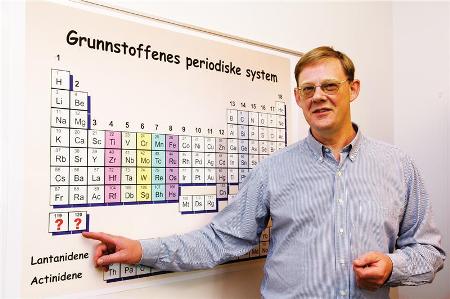Two international research teams are in the race to synthezise the heaviest substance in the world in a lab. Substances having an atomic number beyond 104 are called super-heavy elements.
Researchers had succeeded in synthesizing element 118. Now, the two research teams are trying to create elements 119 and 120. One research team comprises Jon Petter Omtvedt of the University of Oslo and his colleagues from the United States, Japan and Western European nations. The team is conducting its research at the German GSI Helmholtzzentrum für Schwerionenforschung.
 Professor Jon Petter Omtvedt hopes to extend the periodic table with elements 119 and 120. Photo: Yngve Vogt/Apollon-UiO
Professor Jon Petter Omtvedt hopes to extend the periodic table with elements 119 and 120. Photo: Yngve Vogt/Apollon-UiO
The second team is a combination of American and Russian researchers conducting their research at the Joint Institute for Nuclear Research located in Dubna. The heavier the element, the longer will be the production time. When researchers invented element 106, the production time of one atom of the element 106 was 1 hr and its half-life time was 20 s. The time was extended for the synthesis of the element 118, from one hour to one month for the production of its one atom, while its half-time was reduced to 1.8 ms.
The competition of synthesizing the element 119 began two weeks before when Oak Ridge National Laboratory’s nuclear physics facility created 20 mg of berkelium, the highly radioactive element with a density higher than uranium and half-life of 320 days, utilizing specially designed nuclear reactors. Each team got 10 mg of berkelium to conduct the research.
To synthesize the element 119, berkelium and titanium atoms have to be fused together by bombarding a metal plate attached with berkelium atoms using a beam of titanium atoms. Here the challenge is, the berkelium material must be used before it decays to some other lighter element. The atomic number of berkelium is 97 and that of titanium is 22. Hence, their total proton count is 119, which is the exact number required to produce the element 119.
Omtvedt stated that his team is using a special technique to create powerful titanium beams, which will be bombarded on the metal plate at a rate of 5 trillion titanium atoms per second. However, the chance of a direct hit on the berkelium atoms is very low. His team can get a complete atom in less than a month but to identify that one atom is very difficult, as there are over 100,000 superfluous incidents happening on the metal plate per second, he said.
The only method to detect that atom is to gauge the atom’s radioactive radiation immediately when it decays. The surest way to identify the atom is to investigate all its ‘daughter’ elements produced when it decays. Such a sequence of fissions takes place in several steps and only if the sequence happens in a specific manner, the existence of the new element can be ascertained by the researchers. To do that the researchers have developed ultrafast detectors, Omtvedt said. The researchers try to understand the reasons behind the instability of an element and its composed state.